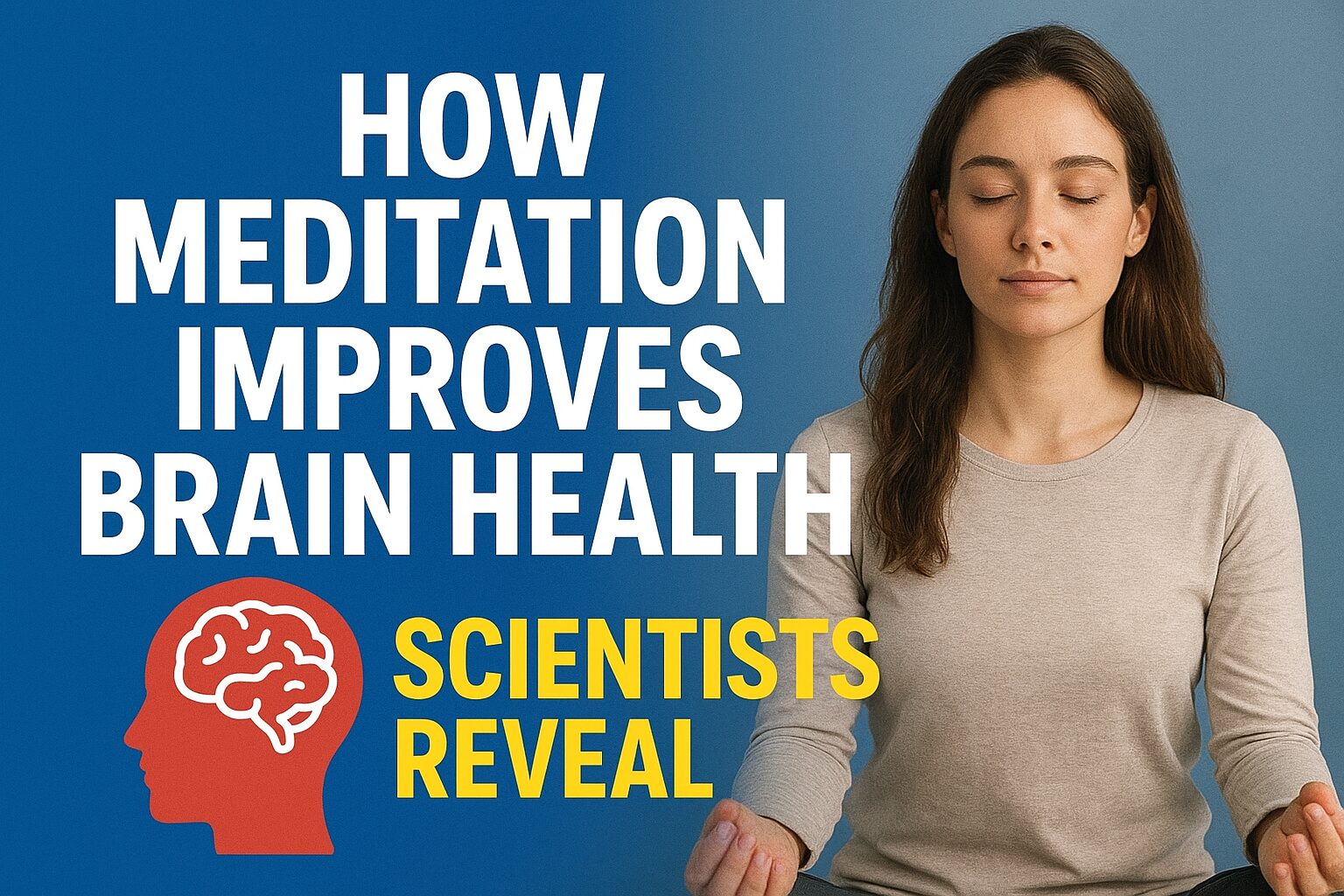In a world driven by screens and stress, meditation has emerged as one of the most effective tools for improving brain health. From enhancing focus and memory to reducing anxiety and depression, research in 2025 continues to uncover the remarkable ways meditation reshapes the human brain. Experts say it’s not just a spiritual practice anymore it’s neuroscience in action.
- 1. The Science Behind Meditation and Brain Health
- 2. Meditation’s Impact on Focus, Memory & Emotional Balance
- 3. Meditation for Mental Health: Anxiety, Depression & Stress Relief
- 4. Different Types of Meditation and Their Benefits
- 5. How Meditation Affects the Aging Brain
- 6. Integrating Meditation into Daily Life
- Conclusion:
1. The Science Behind Meditation and Brain Health
Modern neuroscience confirms what ancient traditions knew for centuries meditation changes the brain’s structure and function. A groundbreaking study by the National Institute of Mental Health (NIMH) found that individuals who meditate regularly have thicker gray matter in areas responsible for memory, emotion regulation, and decision-making.
Functional MRI scans show increased activity in the prefrontal cortex, the region that governs focus and reasoning. Meanwhile, the amygdala the brain’s stress and fear center becomes less reactive over time.
Dr. Laura Simmons, a neuroscientist at Harvard Medical School, explains: “Meditation literally rewires the brain. It strengthens neural pathways that promote calmness, empathy, and clarity while weakening those associated with anxiety and impulsivity.”
2. Meditation’s Impact on Focus, Memory & Emotional Balance
Practicing meditation daily can sharpen attention and improve cognitive performance. Even 10–15 minutes a day can boost memory recall, creativity, and decision-making skills.
Studies show that meditation increases hippocampal density, which supports learning and long-term memory. It also enhances neuroplasticity, allowing the brain to adapt and form new neural connections more easily.
Emotionally, meditation encourages mindfulness — the ability to stay present. This awareness reduces overthinking and improves emotional regulation, making people more resilient to stress and burnout.
3. Meditation for Mental Health: Anxiety, Depression & Stress Relief
The benefits of meditation go far beyond focus and memory. Psychologists are increasingly prescribing meditation to patients with anxiety and depression as part of a holistic mental health plan.
Meditation helps lower cortisol levels, the body’s primary stress hormone. It also triggers the release of serotonin and dopamine, neurotransmitters responsible for happiness and motivation.
Clinical trials show that meditation is as effective as antidepressant medications for mild to moderate depression without the side effects. Combined with therapy or physical exercise, it forms a powerful shield against chronic stress and emotional fatigue.
4. Different Types of Meditation and Their Benefits
There’s no one-size-fits-all approach to meditation. Experts recommend experimenting with various techniques to find what works best:
- Mindfulness Meditation: Focuses on breathing and body sensations; ideal for reducing anxiety.
- Loving-Kindness Meditation (Metta): Encourages compassion and empathy, improving emotional well-being.
- Transcendental Meditation: Uses silent mantras to promote deep relaxation and mental clarity.
- Body Scan Meditation: Helps release tension and build awareness of physical sensations.
- Breath Awareness Meditation: Calms the nervous system and lowers blood pressure.
Dr. Rahul Banerjee, a meditation therapist, adds: “Consistency is more important than duration. Even five minutes a day can transform your mindset over time.”
5. How Meditation Affects the Aging Brain
As people age, cognitive decline and memory loss become major concerns. Meditation has shown promise in slowing down brain aging. A study published in Frontiers in Psychology (2025) revealed that long-term meditators had brain structures similar to people 10 years younger.
Meditation also boosts telomere length the protective caps on chromosomes that shorten with stress and aging. This means regular practice may not only protect the brain but also promote longevity.
6. Integrating Meditation into Daily Life
Meditation doesn’t require hours of silence or special training. Here are practical ways to include it in a busy lifestyle:
- Start your morning with 5 minutes of deep breathing.
- Use guided meditation apps like Calm, Headspace, or Insight Timer.
- Practice mindfulness during daily activities like walking or eating.
- Take short “mental breaks” at work to refocus.
Experts recommend maintaining a consistent schedule and creating a quiet corner for meditation. The key is repetition small, daily efforts bring lasting change.
Conclusion:
In 2025, meditation is no longer seen as an alternative trend it’s a scientifically proven way to enhance brain health and emotional stability. Whether you’re a corporate professional, student, or retiree, just a few minutes of daily mindfulness can lead to sharper focus, reduced stress, and a happier, more peaceful mind.
As science continues to uncover its vast benefits, one thing is clear: the path to mental wellness begins by looking inward.








